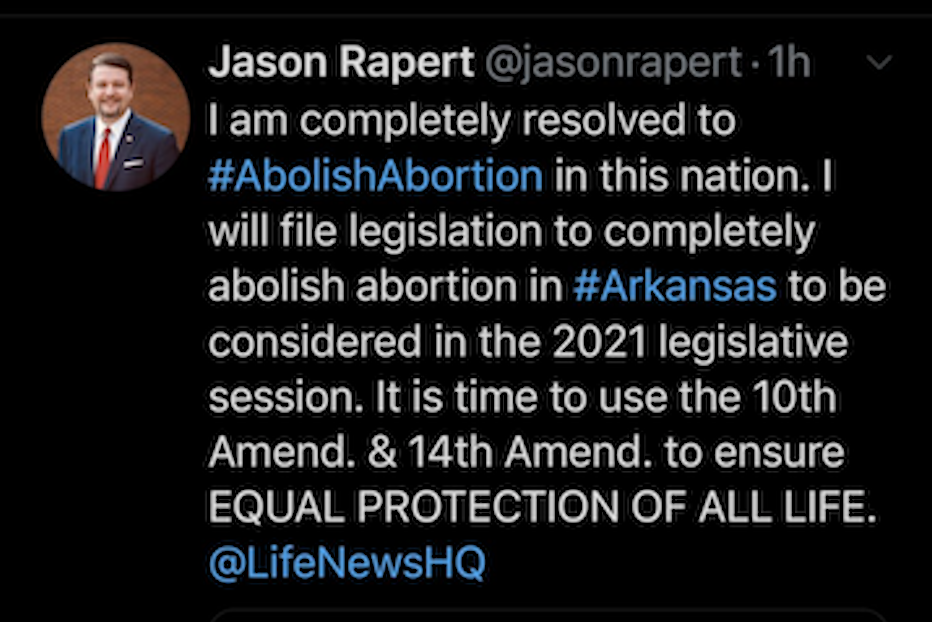More than once on this blog, we have noted that State Sen. Jason Rapert1 is not a constitutional scholar. (See, for instance, here, here, here, and here.) The broader message of those posts has always been to point out that Sen. Rapert, being a third-rate hilljack idiot, likes to bluster about the law and the constitution without seeming to have much grasp of either.2
It appears we can add “understanding the words used in a Supreme Court decision” to the list of law-related topics with which he struggles.
On Monday, following the U.S. Supreme Court’s decision in June Medical Services LLC, et al. v. Russo, in which the Court struck down a Louisiana law that required doctors who performed abortions to have admitting privileges in nearby hospitals, Senator Slackjaw fired up his outrage machine and Tweeted:

Now, in case you haven’t read the decision in June Medical Services, what you need to know is that Chief Justice John Roberts was the fifth vote for striking down the Louisiana law, which he provided by concurring with the result–striking down the law–but for reasons different and more narrow than the four other justices who voted to strike it down. Chief Justice Roberts based his concurring opinion on the fact that the Louisiana law was basically identical to a Texas law that the Court had struck down in Whole Woman’s Health v. Hellerstedt3 in 2016.
Importantly, Roberts had dissented in Whole Woman’s Health. So what changed for Roberts between that case and Monday’s decision? Nothing. Roberts specifically wrote in in his concurrence in June Medical that he was agreeing with the decision to strike down the Louisiana law because, while he “continue[d] to believe that [Whole Woman’s Health] was wrongly decided,” the “doctrine of stare decisis requires us, absent special circumstances, to treat like cases alike.” Accordingly, because “[t]he Louisiana law imposes a burden on access to abortion just as severe as that imposed by the Texas law, for the same reasons[,] Louisiana’s law cannot stand under our precedents.”4
Roberts then went into a discussion of stare decisis, explaining that, “It has long been an established rule to abide by former precedents, where the same points come again in litigation; as well to keep the scale of justice even and steady, and not liable to waver with every new judge’s opinion.” Importantly, as it relates to Jason Rapert’s digital idiocy, Roberts wrote, “for precedent to mean anything, the doctrine must give way only to a rationale that goes beyond whether the case was decided correctly.”
Unless you are Jason Rapert, you likely see where this is going.
In Roe v. Wade (1973), a 7-2 majority of the Supreme Court struck down a law banning all abortions in Texas, holding, “This right of privacy, whether it be founded in the Fourteenth Amendment’s concept of personal liberty and restrictions upon state action, as we feel it is, or…in the Ninth Amendment’s reservation of rights to the people, is broad enough to encompass a woman’s decision whether or not to terminate her pregnancy.”5 Nineteen years later, in Planned Parenthood v. Casey (1992), the Court reaffirmed the basic tenets of Roe, that the constitution protects the right to make decisions about procreation, as long as those decisions are balanced against a state’s interests in “safeguarding health, maintaining medical standards, and in protecting potential life.”
This is not to say that a state cannot pass any laws regarding or regulating abortion; the Court has certainly allowed laws regarding parental notification/permission, waiting periods, and the like. However, the long-standing effect of Roe and Casey and other post-Roe decisions is that a state law that banned all abortions (directly or indirectly) would be unconstitutional on its face.
With all this in mind, Rapert’s promise to “file legislation to completely abolish abortion in Arkansas” can only mean a few possible things: He has not read June Medical and is simply talking out of his ass; he has read the decision, but he doesn’t understand what all the big Latin words mean, so he’s talking out of his ass; or he has read the decision, knows that a law that banned all abortions in the state would be unconstitutional and would be struck down by the federal courts, and is fine with wasting everyone’s time and costing the state tens of thousands in legal fees to the ACLU because he just wants to grandstand about how he passed a law and “activist judges” struck it down.6
I am not sure which one of these possible answers is worst. The first one would mean that he’s a lazy blowhard who doesn’t actually care how the law and courts work if that reality doesn’t fit with the overbearing worldview he wants to impose on Arkansans. The second one would mean that he is not smart enough to understand the decision and just plans to say “damn the torpedoes; full ignorance ahead!” And the last one would mean that he’s fine with wasting time and taxpayers’ money to pass an unconstitutional law as long as it gives him something to brag/whine about while running for Lt. Governor in 2024.
Sigh.
We have been writing about Jason Rapert’s penchant for introducing worthless bills for a looong time. When that first post about him went up on March 7, 2011, we were still forty-one days away from the debut of the first episode of Game of Thrones. Osama bin Laden, Kim Jong Il, Nate Dogg, Elizabeth Taylor, and Ferlin Husky were all still alive. The Joplin tornado was still more than two months away.
Think of everything that has changed in the past 9 years, 3 months, and 25 days, both in the world and in how you view and interact with the world. Now think about how much effort it must take for someone like Jason Rapert to have not changed at all over that same time. 3,405 days later, he is still the same dull, unoriginal, hateful, shady, bloviating, demagoguing shitwhistle that he ever was.
For someone with an ounce of self-awareness, that would be an embarrassing realization.
(R-Up His Own Ass)↩
That probably goes back to his dropping out of law school in the first week, but I’m just speculating.↩
579 U. S. _ (2016)↩
591 U.S. __ (2020), slip op., at *2 (Roberts, C.J., concurring).↩
410 U.S. 113, 153 (1973)↩
I suppose there is a fourth option: That he has read it, he knows the law would be unconstitutional, and he doesn’t actually plan to introduce it and just wants to crow about it right now. But that course of action would not fit anything we know about this ten-cent Elmer Gantry, so it doesn’t seem plausible.↩
